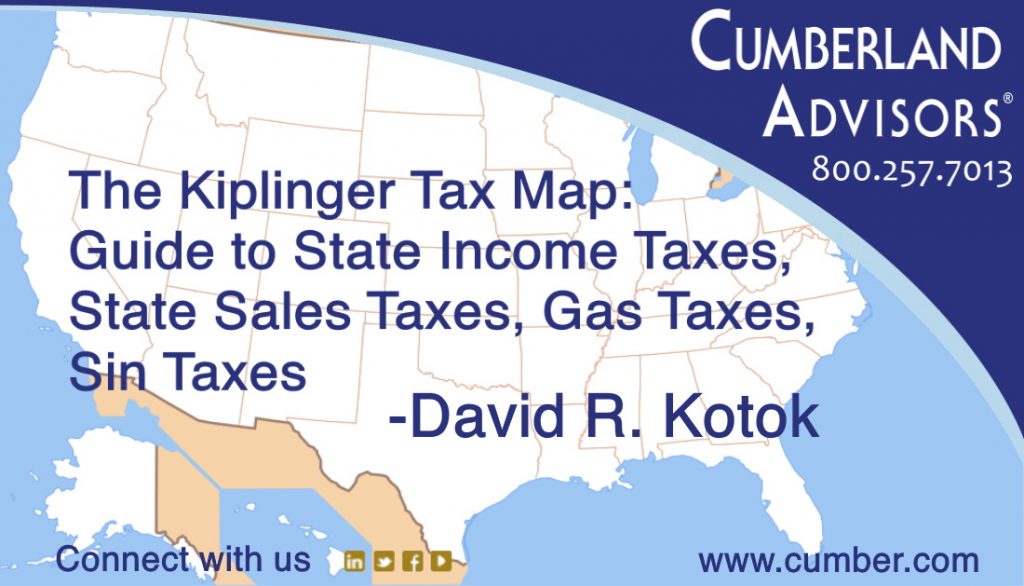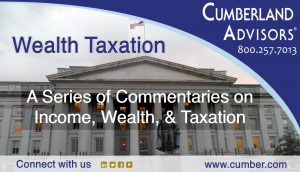We’re again returning to the complex subject of wealth taxation. Why? A number of readers have asked us for further details about it.
For example: isn’t real estate taxation a form of a wealth tax? And if the tax on your house is limited in deductions because of SALT, isn’t that a federal form of a hidden wealth tax? As readers can quickly see, this becomes complex quickly.
The following link takes you to a Kiplinger interactive breakdown of taxation in all 50 states. It is not just an income-tax-rate comparison. For example, you can see just how devastating the real estate property tax burden is in New Jersey. Readers may set up their own comparisons. We thank Kiplinger for offering this public service.
“State-by-State Guide to Taxes”
https://www.kiplinger.com/tool/taxes/T055-S001-kiplinger-tax-map/index.php
We are stressing this taxation issue for good reason. We believe a major change in American taxation may be coming soon if the next national election outcome alters the landscape.
Political forces suggest that the Democrats will retain their majority in the House. The Senate has become less certain and could flip to a Democratic, Schumer-led chamber if a backlash election places the White House in Democratic control.
The leading Democratic contenders have all outlined taxation plans, and every one raises income or wealth or capital gains or other forms of taxation. The political rhetoric attacks billionaires, but the actual proposed changes reach far below that threshold. Even socialist Bernie Sanders has a public wealth tax proposal that starts at $16 million.
As has been the case in previous American historical instances, tax rhetoric targets the very wealthy few while policy ends up taxing many. Remember, the Alternative Minimum Tax was initially aimed at just 200 taxpayers. By the time it was finally rolled out, it had grown into a distorted tax policy that impacted millions of middle-class working households.
The issue for investors is complex, since elections are hard to forecast a year in advance. A Trump re-election implies a continued McConnell-led Senate. Taxes are not likely to rise under that scenario, and wealth taxation would have little chance of passage.
A Warren- or Harris- or Sanders- or Biden-led White House, with Schumer replacing McConnell, is an almost certain recipe for higher income and cap-gains taxation, plus an attempt to repeal the SALT provision. Wealth and estate and trust taxation are more difficult to forecast now. One thing is sure: In a Schumer-led Senate with a Warren presidency, no likely tax changes will be pro-investor.
Markets are always trying to be forward-looking as they reprice risk. We have already seen that with investor aversion to the healthcare sector of the stock market, a reaction that we now believe is overdone. We like that sector and are overweight healthcare in our US stock market ETF accounts.
As for politics and taxation strategy, all of the candidates’ proposals need more detailed research and analysis as to their likely effects and possible unintended consequences. Remember that the tax policy of a specific candidate can survive even if the candidate doesn’t.
A trillion-dollar Trump Administration federal deficit, in combination with many states being in various degrees of financial trouble, warns of much higher taxation, with complex new forms of taxation piled on top of the existing ones.
The implications for markets are many, and some markets are showing nervousness. We advise all readers to commence early planning with their lawyers or accountants or tax advisers. We could be facing huge changes or no changes or something in between. The time to flee a tsunami is before it hits. Then hope a washout doesn’t occur.
David R. Kotok
Chairman and Chief Investment Officer
Email | Bio
Here are links to our recent writings on the subject of Wealth Taxation.
“Wealth Tax,” David Kotok, October 9, 2019
https://www.cumber.com/cumberland-advisors-market-commentary-wealth-tax/
“Taxing Wealth Instead of Income?” Bob Eisenbeis, February 13, 2019
https://www.cumber.com/taxing-wealth-instead-of-income/
“Taxing Wealth Instead of Income, Part 2,” Bob Eisenbeis, October 15, 2019
https://www.cumber.com/taxing-wealth-instead-of-income-2/
"The Kiplinger Tax Map: Guide to State Income Taxes, State Sales Taxes, Gas Taxes, Sin Taxes," David Kotok, October 25, 2019
https:/www.cumber.com/cumberland-advisors-market-commentary-the-kiplinger-tax-map-guide-to-state-income-taxes-state-sales-taxes-gas-taxes-sin-taxes/
Links to other websites or electronic media controlled or offered by Third-Parties (non-affiliates of Cumberland Advisors) are provided only as a reference and courtesy to our users. Cumberland Advisors has no control over such websites, does not recommend or endorse any opinions, ideas, products, information, or content of such sites, and makes no warranties as to the accuracy, completeness, reliability or suitability of their content. Cumberland Advisors hereby disclaims liability for any information, materials, products or services posted or offered at any of the Third-Party websites. The Third-Party may have a privacy and/or security policy different from that of Cumberland Advisors. Therefore, please refer to the specific privacy and security policies of the Third-Party when accessing their websites.
Sign up for our FREE Cumberland Market Commentaries
Cumberland Advisors Market Commentaries offer insights and analysis on upcoming, important economic issues that potentially impact global financial markets. Our team shares their thinking on global economic developments, market news and other factors that often influence investment opportunities and strategies.



